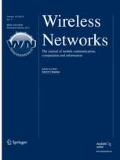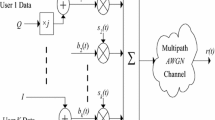Abstract
The primary purpose of this work is to provide a perspective on adaptive code-division multiple-access (CDMA) MU receivers that have been proposed for future digital wireless systems. Adaptive receivers can potentially adapt to unknown and time-varying environmental parameters such as the number of users, their received powers, spreading codes and time-delays. Two adaptive receiver architectures are primarily considered – one in which the sampled received signal is filtered, and can be used in both the uplink (i.e., at the base station) and downlink (i.e., at the mobile handset), and another in which the spreading codes of users are filtered (assuming knowledge of users’ codes and its timing at the receiver) for use in the uplink. Relevant issues such as training-based and blind implementations of the adaptive receiver are discussed, as well as (transient) convergence rates and estimation noise in steady-state.
Similar content being viewed by others
References
D.S. Chen and S. Roy, An adaptive multiuser receiver for CDMA systems, IEEE Journal of Selected Areas in Communications 12(5) (June 1994) 808–816.
D. Divsalar and M. Simon, Improved CDMA performance using parallel interference cancellation, Technical Report 95-21, Jet Propulsion Lab., California Inst. of Tech. (October 1995).
A. Duel-Hallen, A family of multiuser decision-feedback detectors for asynchronous code-division multiple-access channels, IEEE Transactions on Communications 43(2/3/4) (February/March/April 1995) 421–434.
H. Elders-Boll, M. Herper and A. Busboom, Adaptive receivers for mobile DS-CDMA communication systems, in: Proceedings of IEEE Vehicular Technology Conf. (VTC), Phoenix, AZ (May 1997) pp. 2128–2132.
U. Fawer and B. Aazhang, A multiuser receiver for code division multiple access communications over multipath channels, IEEE Transactions on Communications 43(2/3/4) (February/March/April 1995) 1556–1565.
A. Haimovich and Y. Bar-Ness, On the performance of a stochastic gradient-based decorrelation algorithm for multiuser multicarrier CDMA, Wireless Personal Communications 2 (1996) 357–371.
S. Haykin, Adaptive Filter Theory (Prentice-Hall, Englewood Cliffs, NJ, 3rd ed., 1996).
M. Honig, U. Madhow and S. Verdú, Blind adaptive multiuser detection, IEEE Transactions on Information Theory 41(4) (July 1995) 944–960.
R.A. Iltis, Joint estimation of PN code delay and multipath using the extended Kalman filter, IEEE Transactions on Communications 38(10) (October 1990) 1677–1685.
R.A. Iltis and L. Mailaender, An adaptive multiuser detector with joint amplitude and delay estimation, IEEE Journal on Selected Areas in Communications 12(5) (June 1994) 774–784.
T.J. Lim and L.K. Rasmussen, Adaptive delay tracking in asynchronous multiuser CDMA systems, in: Proceedings of International Symposium on Spread Spectrum Techs. and Applications (ISSSTA), Mainz, Germany (September 1996) pp. 1001–1005.
T.J. Lim and L.K. Rasmussen, Adaptive symbol and parameter estimation in asynchronous multiuser CDMA detectors, IEEE Transactions on Communications 45(2) (February 1997) 213–220.
R. Lupas and S. Verdú, Linear multiuser detectors for synchronous code-division multiple-access channels, IEEE Transactions on Information Theory 35(1) (January 1989) 123–136.
R. Lupas and S.Verdú, Near-far resistance of multiuser detectors in asynchronous channels, IEEE Transactions on Communications 38(4) (April 1990) 496–508.
U. Madhow and M.L. Honig, MMSE interference suppression for direct-sequence spread-spectrum CDMA, IEEE Transactions on Communications 42(12) (December 1994) 3178–3188.
N.R. Mangalvedhe and J.H. Reed, Blind CDMA interference rejection in multipath channels, in: Proceedings of IEEE Vehicular Technology Conf. (VTC), Phoenix, AZ (May 1997) pp. 21–25.
S.L. Miller, An adaptive direct-sequence code-division multiple-access receiver for multiuser interference rejection, IEEE Transactions on Communications 43(2/3/4) (February/March/April 1995) 1746–1755.
S.L. Miller, Training analysis of adaptive interference suppression for direct-sequence code-division multiple-access systems, IEEE Transactions on Communications 44(4) 488–495 (April 1996).
U. Mitra and H.V. Poor, An adaptive decorrelating detector for synchronous CDMA channels, IEEE Transactions on Communications 44(2) (February 1996) 257–268.
S. Moshavi, E.G. Kanterakis and D.L. Schilling, Multistage linear receivers for DS-CDMA systems, International Journal of Wireless Information Networks 3(1) (1996) 1–17.
L.B. Nelson and H.V. Poor, Iterative multiuser receivers for CDMA channels: an EM-based approach, IEEE Transactions on Communications 44(12) (December 1996) 1700–1710.
P. Patel and J. Holtzmann, Analysis of simple successive interference cancellation scheme in a DS/CDMA system, IEEE Journal on Selected Areas in Communications 12(5) (June 1994) 796–807.
P.B. Rapajic and B.S. Vucetic, Adaptive receiver structures for asynchronous CDMA systems, IEEE Journal on Selected Areas in Communications 12(4) (May 1994) 685–697.
L.K. Rasmussen, T.J. Lim and T.M. Aulin, Breadth-first maximum-likelihood detection in multiuser CDMA, IEEE Transactions on Communications, to appear.
S. Roy, Subspace blind adaptive detection for multi-user CDMA, IEEE Transactions on Communications, submitted.
M.K. Varanasi and B. Aazhang, Multistage detection in asynchronous code-division multiple-access communications, IEEE Transactions on Communications 38(4) (April 1990) 509–519.
S. Vembu and A.J. Viterbi, Two different philosophies in CDMA – a comparison, in: Proceedings of IEEE Vehicular Technology Conf. (VTC), Atlanta, GA (April/May 1996) pp. 869–873.
S. Verdú, Minimum probability of error for asynchronous Gaussian multiple-access channels, IEEE Transactions on Information Theory 32(1) (January 1986) 85–96.
S. Verdú, Adaptive multiuser detection, in: Code Division Multiple Access Communications, eds. S.G. Glisic and P.A. Leppanen (Kluwer Academic, The Netherlands, 1995) pp. 97–116.
S. Verdú, Demodulation in the presence of multiuser interference: progress and misconceptions, in: Intelligent Methods in Signal Processing and Communications, eds. D. Docampo, A. Figueiras-Vidal and F. Perez-Gonzalez (Birkhauser, Boston, 1997) Chapter 2, pp. 15–44.
L. Wei, L.K. Rasmussen and R. Wyrwas, Near-optimum tree-search detection schemes for bit-synchronous multiuser CDMA systems over Gaussian and two-path Rayleigh fading channels, IEEE Transactions on Communications, to appear.
B. Widrow and S.D. Stearns, Adaptive Signal Processing (Prentice-Hall, Englewood Cliffs, NJ, 1985).
Z. Xie, C.K. Rushforth and R.T. Short, Multiuser signal detection using sequential decoding, IEEE Transactions on Communications 38(5) (May 1990) 578–583.
Z. Xie, R.T. Short and C.K. Rushforth, A family of suboptimum detectors for coherent multiuser communications, IEEE Journal on Selected Areas in Communications 8(4) (May 1990) 683–690.
N. Zečević and J.H. Reed, Blind adaptation algorithms for direct-sequence spread-spectrum CDMA single-user detection, in: Proceedings of IEEE Vehicular Technology Conf. (VTC), Phoenix, AZ (May 1997) pp. 2133–2137.
Author information
Authors and Affiliations
Rights and permissions
About this article
Cite this article
Lim, T.J., Roy, S. Adaptive filters in multiuser (MU) CDMA detection. Wireless Networks 4, 307–318 (1998). https://doi.org/10.1023/A:1019116709390
Issue Date:
DOI: https://doi.org/10.1023/A:1019116709390




